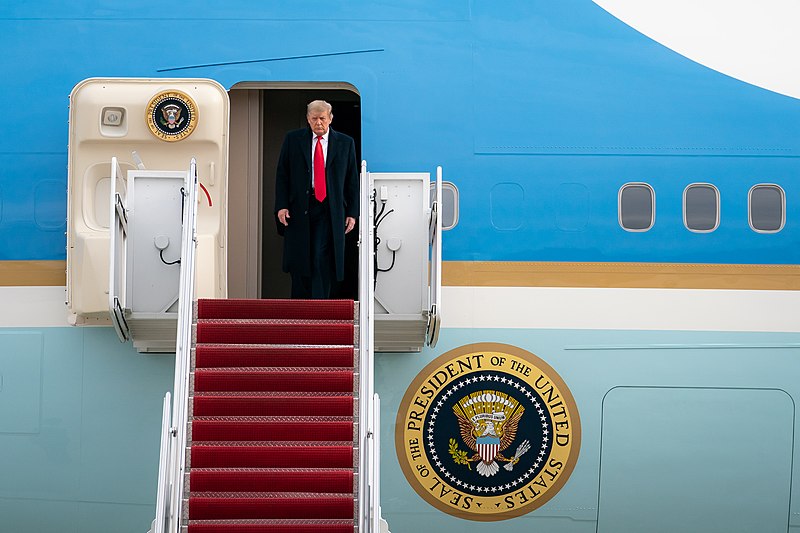Donald Trump now only has less than 20 days left until he officially has to leave the White House. However, with his insistence to overturn the election results in his favor, 10 former Pentagon Secretaries have now spoken out.
All 10 living former Defense Secretaries, both Democrat, and Republican signed onto an op-ed piece that was published over the weekend by the Washington Post warning Trump not to involve the military in his push for pursuing his claims of voter fraud. Despite having been refuted many times over, Trump continues to insist that election misconduct occurred without providing any evidence. The lawsuits challenging election results in swing states have also been widely unsuccessful, even the lawsuits turned to the Supreme Court. In the piece, they questioned Trump’s capability to ensure a peaceful handover of power to the next administration.
They also issued a warning against involving the military to change the results of the elections. “Efforts to involve the US armed forces in resolving election disputes would take us into dangerous, unlawful, and unconstitutional territory,” they wrote in the piece. “Civilian and military officials who direct or carry out such measures would be accountable, including potentially facing criminal penalties, for the grave consequences of their actions on the republic.”
The former Secretaries that signed were Dick Cheney, William Perry, Mark Esper, Jim Mattis, William Cohen, Donald Rumsfield, Robert Gates, Leon Panetta, Chuck Hagel, and Ash Carter. Esper is the latest former Defense Secretary who succeeded Mattis in the Trump administration but was dismissed prior to the elections. Their op-ed piece also comes as more military officials have spoken against the possible involvement of the military in Trump’s efforts to overturn the election.
At the same time, Trump has found himself at odds with both Congress and Senate leadership as the days of his presidency dwindle. After vetoing the NDAA bill that received a bipartisan pass from both the House and the Senate, Congress voted to override his veto by passing the bill again. Trump had also warned his GOP colleagues not to override his veto, a move that was made anyway.
Trump vetoed the bill due to the fact that once it is passed, the names of military bases that were named after Confederate generals would be stripped down and changed.



 U.S. Announces Additional $6 Million in Humanitarian Aid to Cuba Amid Oil Sanctions and Fuel Shortages
U.S. Announces Additional $6 Million in Humanitarian Aid to Cuba Amid Oil Sanctions and Fuel Shortages  Netanyahu to Meet Trump in Washington as Iran Nuclear Talks Intensify
Netanyahu to Meet Trump in Washington as Iran Nuclear Talks Intensify  Trump Allows Commercial Fishing in Protected New England Waters
Trump Allows Commercial Fishing in Protected New England Waters  South Korea Assures U.S. on Trade Deal Commitments Amid Tariff Concerns
South Korea Assures U.S. on Trade Deal Commitments Amid Tariff Concerns  Trump Signs Executive Order Threatening 25% Tariffs on Countries Trading With Iran
Trump Signs Executive Order Threatening 25% Tariffs on Countries Trading With Iran  US Pushes Ukraine-Russia Peace Talks Before Summer Amid Escalating Attacks
US Pushes Ukraine-Russia Peace Talks Before Summer Amid Escalating Attacks  Iran–U.S. Nuclear Talks in Oman Face Major Hurdles Amid Rising Regional Tensions
Iran–U.S. Nuclear Talks in Oman Face Major Hurdles Amid Rising Regional Tensions  U.S. to Begin Paying UN Dues as Financial Crisis Spurs Push for Reforms
U.S. to Begin Paying UN Dues as Financial Crisis Spurs Push for Reforms  India–U.S. Interim Trade Pact Cuts Auto Tariffs but Leaves Tesla Out
India–U.S. Interim Trade Pact Cuts Auto Tariffs but Leaves Tesla Out  Trump Endorses Japan’s Sanae Takaichi Ahead of Crucial Election Amid Market and China Tensions
Trump Endorses Japan’s Sanae Takaichi Ahead of Crucial Election Amid Market and China Tensions  Trump Says “Very Good Talks” Underway on Russia-Ukraine War as Peace Efforts Continue
Trump Says “Very Good Talks” Underway on Russia-Ukraine War as Peace Efforts Continue  Trump Backs Nexstar–Tegna Merger Amid Shifting U.S. Media Landscape
Trump Backs Nexstar–Tegna Merger Amid Shifting U.S. Media Landscape  TrumpRx Website Launches to Offer Discounted Prescription Drugs for Cash-Paying Americans
TrumpRx Website Launches to Offer Discounted Prescription Drugs for Cash-Paying Americans  Pentagon Ends Military Education Programs With Harvard University
Pentagon Ends Military Education Programs With Harvard University  Trump Allegedly Sought Airport, Penn Station Renaming in Exchange for Hudson River Tunnel Funding
Trump Allegedly Sought Airport, Penn Station Renaming in Exchange for Hudson River Tunnel Funding  Norway Opens Corruption Probe Into Former PM and Nobel Committee Chair Thorbjoern Jagland Over Epstein Links
Norway Opens Corruption Probe Into Former PM and Nobel Committee Chair Thorbjoern Jagland Over Epstein Links  China Warns US Arms Sales to Taiwan Could Disrupt Trump’s Planned Visit
China Warns US Arms Sales to Taiwan Could Disrupt Trump’s Planned Visit 































